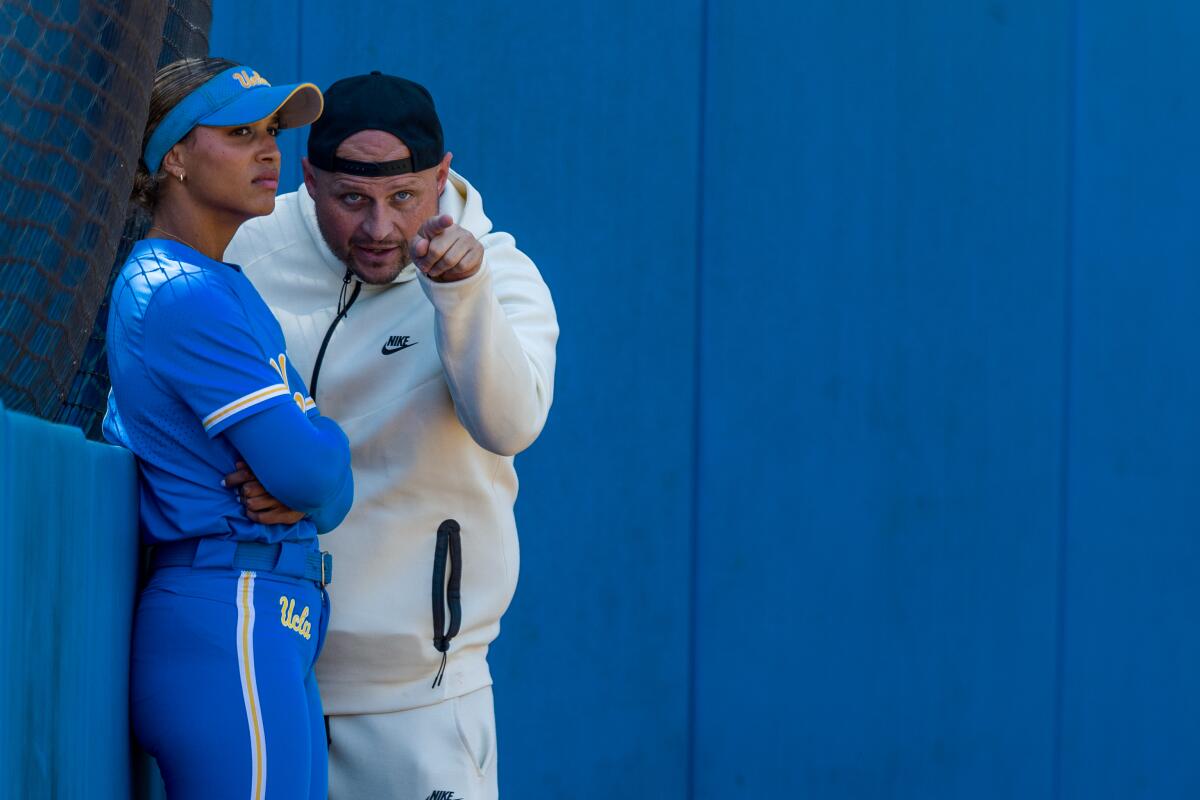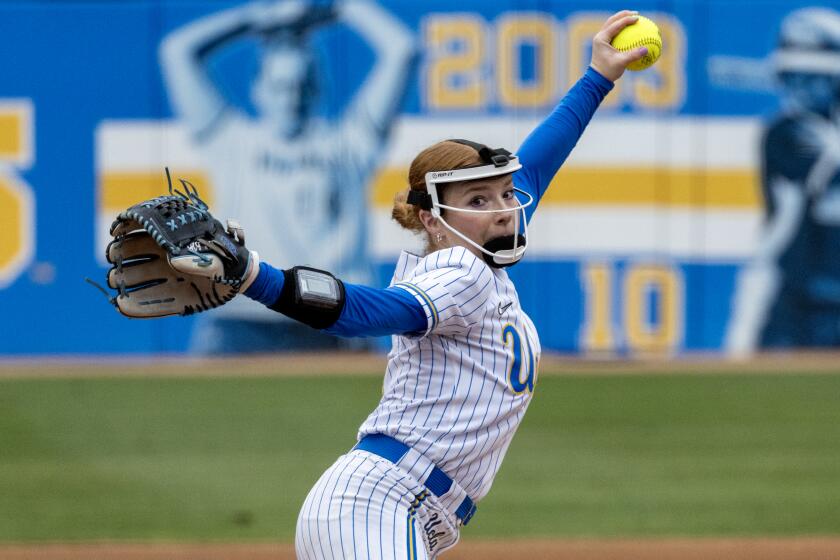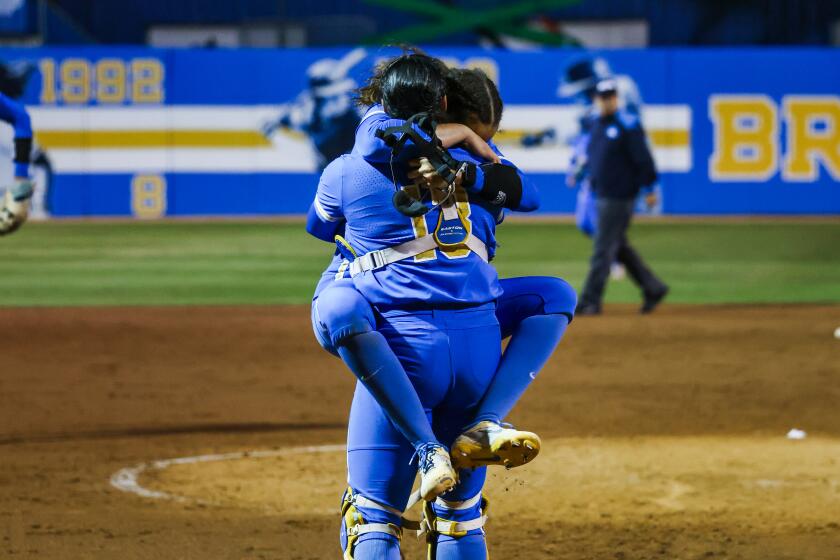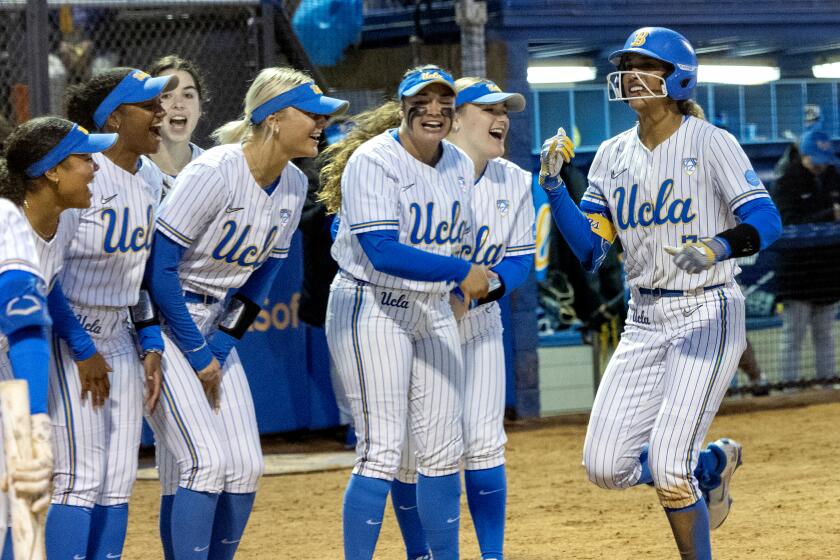How mental performance coach Armando Gonzalez helped UCLA softball find its edge

- Share via
After Jordan Woolery knocked in the tying RBI triple in the bottom of the seventh against Virginia Tech, UCLA players burst out of the dugout in celebration. The outcome in the second game of the NCAA regional semifinal wasn’t sealed, but Thessa Malau’ulu already knew.
Standing at the top of the dugout stairs, the UCLA third baseman mimicked scribbling in the air and yelled toward Woolery: “It’s already written.”
The author of UCLA’s new favorite phrase, wearing a gray and black Nike sweatsuit with his black cap turned upside down on his head, watched from the back of the dugout.
Armando Gonzalez is UCLA’s cheat code. The mental performance coach is the secret behind UCLA’s return to the Women’s College World Series, helping players process the shocking end to last season and tap into their strengths to “level up” and bring the Bruins to their eighth World Series in nine years.
“He’s really just a rock for all of us,” shortstop Maya Brady said.
Kaitlyn Terry and Taylor Tinsley have played leading roles in helping UCLA win 13 consecutive games en route to a berth in the Women’s College World Series.
UCLA coach Kelly Inouye-Perez reached out to Gonzalez, who has worked with star athletes including Dodgers star Mookie Betts, Cubs shortstop Dansby Swanson and Tampa Bay Buccaneers receiver Chris Godwin, at the suggestion of a mutual friend. The 18-year head coach knew she didn’t have the answers for how to get past UCLA’s first winless postseason in more than a decade.
Gonzalez was driving when Inouye-Perez called with her pitch. The team, seeded second in the NCAA tournament last year after its best regular-season since 2001, had experienced major trauma by being swept in the regional at home. The Bruins felt embarrassed.
“They were,” Inouye-Perez continued on the phone.
“Frozen?” Gonzalez interjected.
Exactly.
“Her whole thing was how do we get them to not feel so stuck in that,” Gonzalez said sitting outside the UCLA clubhouse at Easton Stadium, “but then once we got them unstuck, it became how do we build them into these warriors that have an advantage over everyone mentally.”
Gonzalez’s work has helped the Bruins (42-10) become the hottest team in the country with 13 consecutive wins heading into the World Series, where they face No. 14 Alabama (38-18) in the first round Thursday at 9 a.m. PDT (ESPN) at Oklahoma City’s Devon Park. They flexed their mental muscle with five comeback wins of four or more runs, including the thriller against Virginia Tech in the NCAA regional that ended with a Savannah Pola walk-off RBI single.
On the field at Easton Stadium, UCLA’s Sharlize Palacios jumped into Gonzalez’s arms. He lifted the All-Pac-12 first-team catcher into the air.
Trained as a marriage and family therapist, Gonzalez acknowledged that what he does is different in the realm of sports psychology. He uses neurophysiology techniques that go beyond traditional talk therapy.
Consider the pitcher who gets shelled early in a game, Gonzalez said. A player’s body can hold onto that traumatic memory by tightening up the next time on the field. With Gonzalez’s guidance, players learn to work through difficult memories while listening to music and gazing into the distance. They try to access those moments, feel the same emotions, locate a visual cue in the area to create a new connection for the memory then let the brain wander to process the trauma. The technique is called brainspotting.
Taylor Tinsley pitched a complete game and Sharlize Palacios hits two home runs to power UCLA past Georgia and into the Women’s College World Series.
“It’s about this idea that traditional talking through it is only engaging the frontal lobe,” Gonzalez said. “So we’re just getting better at telling rehearsed stories about what we’re experiencing, but we haven’t changed that we’re still experiencing it.”
Brainspotting engages the subcortex where memories are stored, Gonzalez said. It sounds weird, he admits. The room can stay silent for several minutes during sessions. Sometimes athletes emerge dazed with a new sense of clarity they can’t even describe. Don’t worry, he assures them, you don’t need to put words to it.
“It’s like there’s this click that happens,” Gonzalez said, “where this thing that was once distressing you — it’s not gone, it happened to me — but my body doesn’t sense it’s about to happen again.”
While the man players affectionately call “Dr. Mondo” was initially supposed to work directly with only Inouye-Perez and a small group of athletes, he learned all players were craving small bits of time. He has now established relationships with every player on the team.
Gonzalez knows what each one needs heading into game day. During the postseason, he’s with the team in the hotel, then on the bus ride to the stadium. He scopes out how players look in the batting cages, stepping in with a quick pep talk or look of reassurance when needed. He spent about 30 minutes before UCLA’s second super regional game with starting pitcher Taylor Tinsley guiding the sophomore through a meditative session.
After Tinsley pitched seven innings of one-run ball with six strikeouts to clinch UCLA’s spot in the World Series, she shared a hug with Gonzalez on the field.
“We play a game that is 99% mental,” Tinsley said. “I think it’s hardly physical, especially with the competition that we play so he just definitely helped me lock in, level up.”
With Gonzalez working with every player, Inouye-Perez said the Bruins have a deeper and more connected group than ever. He helped strengthen the team by beginning with personal assessments of each player and coach. The results create a guide for them to better understand themselves, giving insight on their strengths, how they like to be spoken to and how they manage adversity. The personality assessments serve as unofficial playbooks for coaches or teammates to understand how to best interact with one another to solve complex problems.
“Coaches get into a single mind focus: it’s a physical preparation — if you just do this then it’ll work,” Inouye-Perez said. “But there’s more to it. … It’s not just about great athletes, it’s understanding how you’re dealing with people and I wanted them to have those tools.”
Gonzalez, who founded a mental health company called Cheatcode, saw players start shedding the trauma of last season’s disappointment at different times. The Bruins slowly transformed into “a different type of beast,” he said. They let go of last year’s struggles. They got back to their baseline. Then they leveled up to becoming relentless competitors who swept preseason Pac-12 favorites Stanford on the road.
The biggest leap was when Palacios launched a tying grand slam in the bottom of the fifth against Arizona on Senior Day that helped UCLA overcome a seven-run deficit in a 11-7 win.
Maya Brady hits two home runs to help push UCLA to an 8-0 victory over Georgia and move to within one win of the Women’s College World Series.
Gonzalez called it the “tectonic shift” of the season.
“As the wins were piling up, all the comeback wins, I just felt like that Arizona game was when it all just clicked,” Gonzalez said. “They truly knew this is ours.”
Unburdened by expectations of the past, the Bruins are now playing with joyful freedom. Gonzalez reminds them before games to enjoy the moment, for the outcome is beyond their control. Among the blue and gold in their dugout, players also sport black T-shirts with “it’s already written” printed on the back.
That’s their cheat code.
More to Read
Go beyond the scoreboard
Get the latest on L.A.'s teams in the daily Sports Report newsletter.
You may occasionally receive promotional content from the Los Angeles Times.










